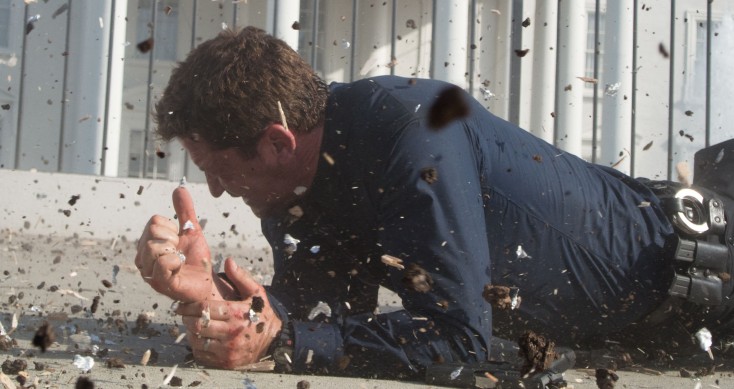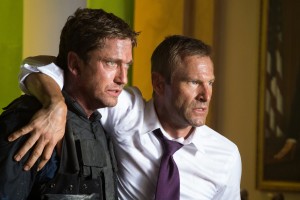(EDITORS: PLEASE NOTE THAT OBSCENITIES HAVE BEEN ASTERISKED)
By ANGELA DAWSON
Front Row Features
HOLLYWOOD—Gerard Butler may be a Scottish by birth but having made his success as an actor here in America, the “300” star appears to have adopted a certain amount of patriotic pride on this side of the pond.
In the action thriller “Olympus Has Fallen,” he plays Banning, a former Secret Service agent who finds himself at the center of a national crisis, when terrorists attack the White House, taking the president and several officials hostage, and he is the only one in the position to save them. As he talks about the fictional crisis, he speaks about the terrorists attack “us” and “our response.”
Butler, 43, not only stars in the film as the hero, he also serves as one of the producers. He took a very hands-on approach, helping shepherd the project to the big screen.
“I love producing” the ruggedly handsome leading man says in his raspy accent. “I was all over this, ripping it apart, putting it back together.”
He worked closely with director Antoine Fuqua, whose other testosterone-charged action movies include “Training Day” “Shooter” and “The Replacement Killers.”
“Antoine and I would be up all night working with the writers (Creighton Rothenberger and Katrin Benedikt) trying to make it better and more gripping, more involved, more connected, more human, more substantive and with better action,” he recalls. “I was involved in every part of it, and I loved it.”
As the star of the film (alongside the likes of Morgan Freeman, Aaron Eckhart, Melissa Leo, Angela Bassett, Robert Forster and Dylan McDermott), Butler didn’t hold back on the physicality. He delivered his usual blunt force audiences have come to expect from this blue-eyed Highlander, including squaring off in a climactic scene with martial arts expert Rick Yune, who plays Kang, the North Korean mastermind of the White House takeover.
Yune, a onetime Olympic hopeful in Tae Kwon Do, says going mano a mano with Butler was more intense than he expected.
“What was choreographed is not what we did,” Yune says with a laugh. “He slipped in a few punches on me, and I returned the favor. And that’s how we got what we got (onscreen). Maybe a day or two later, we were able to laugh about it, but when we were fighting, it was pretty intense.”
Butler, who has traveled extensively around the country promoting the action-packed thriller, is most pleased with the reaction the movie has received from the service men and women at Camp Pendleton in San Diego. He says he is especially encouraged that women, who typically aren’t as keen on action movies as men, are responding to the movie in a positive way.
Q: Do you like the physical part of action movies or would you rather have been sitting in the crisis room talking about strategy in dealing with the terrorists?
Butler: To be honest, I was very jealous the week that Morgan (Freeman, who plays the Speaker of the House) arrived because, literally, this excitement came over the whole set. It was amazing to watch. I really wished I had been involved in those (the crisis room) scenes; it would’ve been great to be in. A lot of my favorite stuff in this movie is what happens in the crisis room. It’s so incredibly gripping to go in and experience what it is those people do that we don’t know when this type of thing happens.
On 9/11, we were saying, ‘Where is the President? Who’s making decisions? What’s happening?” So it was great to have this incredible cast to really humanize these characters and see the decisions they have to make (behind the scenes) and that they’re real people who happen to make split-second decisions that will affect the planet. The stakes are rising and they’re going into territory where this is no protocol for even what they do, so I would’ve loved to have been involved with that, but it’s fun to go and kick a** as well.
Q: What was your take on Banning?
Butler: Antoine and I wanted to make this guy really, incredibly brittle and uncompromising, (and) to give some satisfaction that I feel in our recent history we felt we never got. After 9/11, it was done. Everybody was gone. Here, we have a standoff situation with an escalating international crisis, but the terrorists are there, and we need to see some payback.
Q: How did you like working with Rick Yune?
Butler: Rick’s been doing this his whole life. He is the ultimate bad***, so I wasn’t relishing those three days of fighting him. I’ve done a lot of action movies and worked with a lot of stunt teams, and we had a phenomenal stunt team in this movie. (They were) former Navy SEALS and martial arts experts, so for me, I was just constantly practicing my moves and loading guns. While I’m talking to people I was (mimics loading gun) to keep up
Q: You also got in the boxing ring now and then with your director, Antoine Fuqua to stay in shape, right?
Butler: The only person on this (production) who could come close to being the biggest bad*** on the planet other than Rick would be Antoine. He’s seriously a Golden Gloves boxer, but he also understands character. You can say so much with the fights, or you can say nothing. We were always about this specific kind of intention behind this fighting because stunt guys are incredible, but they’ll often give you stunt-y moves, and you [say], “No, I want this. I want a surprise or I want to be lethal or I want to punish.” You want to know what’s the intention behind that. When you’ve got a guy like Antoine who completely understands that and yet understands character and performances, that’s why we have such a rich movie. It’s not just an action movie; it’s (also) a thriller. It’s an emotional ride as well with characters you get involved with because he does all of that.
Q: How does Aaron Eckhart’s depiction of the president compare to other actor’s depictions of the Commander in Chief?
Butler: He brought so much to life for that President, and having worked with him, I was totally inspired by the intensity because what we all have to go through, but what the President has to go through, that’s hard to keep up. Nobody is more committed and prepared and stays in that space like he does. I thought I was pretty committed, but I’d watch him and be very very impressed. You really feel that tenacity, commitment and brilliance from Aaron.
Q: This also has the requisite explosions and special effects you expect from an action thriller like this.
Butler: In this situation, I think the explosions actually are important because this takedown of the White House is one of the most unforgettable action sequences. It has such a purpose behind it. It’s all relevant. How did they do it? What is the intelligence they use? It’s a very powerful thing to experience because we focused, especially Antoine, on grounding it, (and thinking about) what would this really looks like, smell like (and) taste like. So you’re totally pulled into this. In that respect, I think every gunshot and every explosion is mind-blowing.
Q: What was the reception when you showed this to the troops at Camp Pendleton?
Butler: It was a huge fear when we talked about showing it to the military, especially the Marines, I always thought, “Well, how are they going to react to this?” because this (movie focuses) on a day we where there has been a big fail (in terms of preparedness against a terrorist attack). So I stayed (for the whole screening) even though I was more terrified than anybody (of what the reaction would be), and I thought, “If it’s not going well, I’m going to leave before the end.” But they got exactly the heart and soul and the point of the movie. They got the humor in it—there are a lot of funny moments— they got the inspiration in it, they got the intelligence of it and they enjoyed the action of it. They took it for exactly what it is—provocative entertainment. (He plays back the enthusiastic response of the audience he recorded at the end of the screening). That’s the Marines. We also screened this in Washington to political journalists, to government officials, to Secret Service and they went crazy for it. We screened it to the literati in New York (and) they loved it. We’ve done word-of-mouth screenings all over the country and it’s been—really, I don’t think we expected that response, but everybody takes out of it what they need.
Q: How do you feel about having the first big action summer movie out of the block? Do you think women will want to see it?
Butler: A movie like this, when you advertise it, it’s not the first thing women imagine going to see, but it’s a movie that when they do go to see it, they get as much out of it as the men. I think it’s important to emphasize that so (female moviegoers) know that this is a movie they could enjoy and experience and really get a lot out of.
Q: Was it tough being both the star and producer of this?
Butler: That was the issue for me and Antoine had to remind me of it. (He’d say) “OK, you’re an actor now” because I’d be on the phone talking to the financiers overseas and then suddenly (I) was on, and then I was back to Banning.






